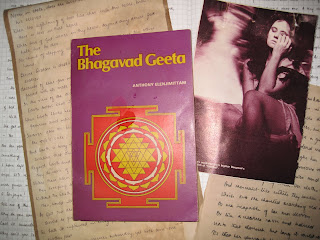An act of kindness and decency can happen outside fairytales. One day, close to last Onam, I had to pay the bill twice at the hotel-cum-tea shop. The owner insisted that I had not paid and since I could not remember either, I paid (again) and left hoping never to return to that favourite place. Today, the hotel owner accosted me at the vegetable-shop and told me that he has been looking for me for five months – he had realized that he had charged me extra after counting the money in the till at the end of that day itself. He did not apologize but insisted that I should have tea with him.
We sat near the counter. The bus-stop is just a few meters to the right. We listened to Karnan, a college student, tell today’s joke to Jaya, an assistant bank manager. The hotel owner whispered to me that it was the one about the drink at Betty’s Legs that had been told two days back; yesterday, it was that about sex and Martians; and today, it is about the kiss and 100 ants (99M,1F) in a box. Karnan usually manages to finish the joke a minute or two before the arrival of the bus. We know that Jaya will listen with rapt attention and smile at the end. Then for the minute or two, till the bus comes to the stop, they enjoy the silence seriously. Even we tried not to slurp loudly during those surreal moments.
After the two left together on the bus, the owner went to his position behind the counter. While I was nursing the last quarter glass of tea, Raman walked in for his morning tea and seeing me there, gestured to me to wait and he went back to his scrap shop. He returned after a few minutes with a sheaf of paper stapled twice or thrice. Raman gave me the bundle and went to another table.
On top, there were torn pages from a book and I recognized it to be Chekhov’s “The Lady With The Dog” and below, some handwritten notes. I caught the waiter’s eye and asked for one more glass of tea. On the first page of the notes, I saw a date marked near the left margin “17/3/1997”. I turned back to the first page of Chekhov’s story. There, in the same handwriting, a date was noted on the right, like in a letter, “3/1/2001” and like mentioning the subject or reference, in the middle, the question “When did I read this before?”
I remember Chekhov’s story. Can I forget? I smiled to myself and turned to the first page of the notes:
----------------------------------------------------------------------
I watch her pack. I cannot assist. It seems that world is strange to me. An old green and white churidaar laid at the bottom; a colourful Rajasthani one on top; then, her underclothes and nightwear; a pair of jeans, a t-shirt, a dull grey and brown shirt and, a white transparent cotton one. I have never seen her wear any of these. On top, she places a diary with old notes and letters, not too many I think but all that really matters. She holds her stuffed monkey (“Chikoo,” she whispers), curls up the long tail around her fingers and a mischievous smile plays around her mouth. She keeps that on top along with a toilet kit; closes, locks and rests awhile.
“It’s not for long. Just for the weekend. Do you mind?” she had asked a few days back.
I was holding her tight. The smell’s still lingering. She disengaged, got out of bed and put on her nightdress.
“You will come back…” a question or a rhetorical one, I was not too sure.
She got under the covers, turned to her side, facing me and said, “Yes.”
We have been married for ten years. This was the first time she had asked me for something. How could I refuse? What is a weekend, after all?
I left her at the airport, kissed and parted. Just like one of those business trips of mine. Maybe, it’s reflection on the mirror – with no sighs of relief. Let everything be well and such quiet understanding. Ten years have gone by without a thought.
“O Sanjaya! Tell me everything.” I pleaded.
“Why do you want to know?” Sanjaya asked.
“Call it cowardly voyeurism, you idiot. I want to know about life.”
“Why can’t you let her go?”
“It does not matter if she goes or comes. It’s the reason that matters.”
Sanjaya then described:
The plane-trip is over and she is waiting for her luggage. She is wearing a churidaar – wine red and looking very fine. Once in a while, she looks at the exit – at taxi drivers, banners to pick up, exhausted relatives, dust and disarray. She wears a bindi.
“Strange. She usually avoids wearing one. Sorry, please continue.” I remark, only partly to Sanjaya.
A tiny nose-ring and an old pair of ear-rings. Two rings on her fingers – her wedding ring and one with aquamarine (her birthstone, right, her lucky one?). A simple maroon leather sandals. She is hardly noticeable in the midst of affluence and over-exertive foreign accents on local tongue. She doesn’t seem to mind her insignificance there. She collects her suitcase and heads for the exit, confident, as if among all those masses, she has an identity and a world of her own.
She walks to the end of the exit path, past taxi-drivers who try to grab her and the relatives who glance briefly, discard and quickly revert to looking at the exit post.
A voice tells her from behind, “I’ll take you home if you will buy for me a cup of coffee.”
“Hi…,” she says softly turning towards him.
“You still walk too slowly. Come on, move… let’s go to the car.”
“You walk ahead. I’ll catch up with you.”
“No way, I want you right in front of me.”
For a while, they stood there. Barely a smile on their lips. Eyes searching each other’s. He raises his eyebrows and she does the same. Echoes of silent memories.
“What’ll you do if I grab you and kiss you?”
“Try…”
“Is that a challenge?”
Laughter, whispers in a loud world. They walk slowly to the car, a run-down blue Fiat with clean, thread-bare upholstery. He edges the car out, nervous of touching a world that’s crowding around them. Nervous, of touching, they sit apart. She turns to look at him.
“Look front,” he says.
“Isn’t that the driver’s job?”
“Nope, never trust the driver.”
“I trust you.”
“I don’t trust the other drivers. Now, be a good kid…”
“Ooofff…”
Not a touch. Not a glance at each other. Not even smiling. Watching for anything that threatens. Watching a world of intimacy, of fulfilled dreams, of others. Scooters whiz past with families of three or four. Rickshaws with couples huddled against a corner.
They sit apart. Like two pebbles on a beach. Not wishing that they were waves - to lash and command. Nor crabs scurrying towards each other. Two pebbles eroding. But remaining there even when their imprints on the sand would be gone.
“Why can’t we be like others?”
“We wouldn’t be together if we were.”
“But, look at them…”
“Lucky ones – lucky not to know that they are alone. Or maybe, asking for no more.”
“But they survive and they are happy.”
“Yes, strange, isn’t it?”
“Maybe, it doesn’t matter.”
“What?”
“To survive and be happy.”
“Then, what matters?”
“Who knows!?”
God? Maybe. Why can’t they be like others? Two people sitting apart in a car. Innocent and aloof, you might think.
“Don’t put words in their mouth, OK? Be satisfied with mere appearances.” And I remind Sanjaya to continue.
“How is your work?” she asks.
“Who cares! It does not matter.”
“Every morning, I resist myself...to contact you. But then, I think that I will merely bore you.”
“Do you really think so?”
“No. But…”
“A life of resistance, resisting to let go. Good for life, I guess. Or, good to live.”
“Why did you send that letter?”
“Which one?”
“The only one. I sat there looking at it, in front of the whole class.” Laughs. “I was so surprised when I saw your handwriting on the envelope. I thought I was dreaming. Swapnam.”
“That’s the female. I prefer to be a nightmare – don’t we remember that longer? Dusswapnam? Sounds more like me, the male. I scribbled something of no consequence, right?”
“Nothing about you. Nothing about me. Only about people that don’t matter. Everything seemed to be between the lines. I went to the Canteen and cried a little. It was one of my happiest days.”
“Tears on the happiest day, that’s the story of my life.”
The car is now in a muddy lane with potholes and craters. Booze joints, with a standing bar past a dark curtain, line either side of the road. These are filled with losers seeking anonymity behind a hazy look. There is an open gate at the end of this lane to nowhere and of noones, it seems.
The car turns in and parks in a shed with asbestos roofing. A few cents of land, with two coconut trees and a mango tree protecting a small house. Mud, grass, green and brown upon the ground. Jasmine, roses red and white, tiny blossoms waking, old ones fading gently, wild. It’s her passion, he knows, and his endeavour, for her.
He opens the door. She enters. Silent. Too tired. To pretend. It is a small house, clean and sparse. One waiting to be filled but will never be.
He places her luggage by the wall. Next to a creeper. Hidden baggage. Hiding arrivals and departures. She places her handbag on the table at the centre. He takes it and places that away on a side-table, along with his watch, his glasses, hers too. He looks around as if he is seeing the room which she has created for him. She is looking at him.
He asks her “You must be tired. Shall I get you something to drink or eat? Do you want to take a shower? Or lie down? I will try not to disturb. Or do you want to see our humble abode?”
“No.”
“Hmmm…”
He goes towards her.
“Why did you stop, Sanjaya?” I plead.
“Let them be alone, you selfish brute,” he replies.
“No. They have been alone. For too long. She – with me. He – with himself. Anyway, they do not care. Nothing can touch them. Just for the weekend…”
He goes towards her. Their eyes search each other’s, with smile-filled tears. Let it flow. He takes her right hand in his. Raises it to his lips. Places a light kiss on the back. She tenses. Tries to take her hand away.
But they let their fingers search, grasping, teasing, caressing each hollow and vein, following the creases, the mounts and the valleys, racing, slowing, their breaths cooling and blowing winds that ruffle all those layers which years have deposited; close but a little away but closer than ever; no weeping willows, just tresses uncared but natural above, laying shadows; tears as dew or rivulets dampen, soften, the smell of earth ploughed fresh, each muscle straining to produce; landscape urging the farmers, as they pluck, cut, dig deeper, harsh at times, kneading the flesh between fingers, feeling the texture, sensing what it is, what it should be; weeds ripped, searching up, below, side and over and over till the roots of disuse are gripped, mangled, strangled, shed aside; little blossoms, tiny hair standing, trying, asking forgiveness, granted, growing life, life, life; each finger feeling, each nerve awakened, kisses, little bites, pinches, sucking tenderly; the morning over marshes of yesterday, the pasture of today, life, life, life…
“Just for the weekend…”

 Lost:
Lost: